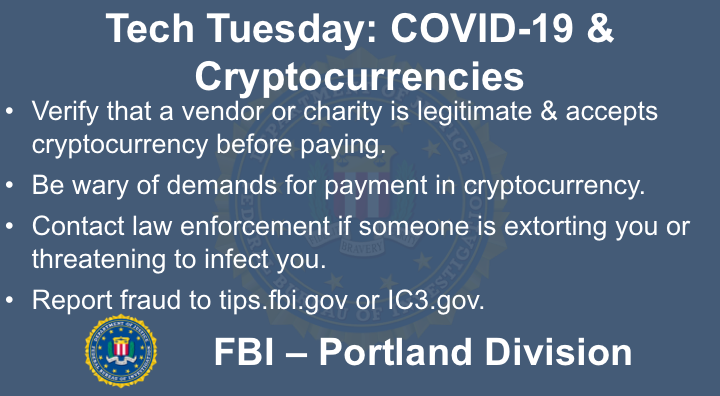Oregon FBI’s Tech Tuesday: COVID-19 and cryptocurrency scams

PORTLAND, Ore. (KTVZ) -- This week, the Oregon FBI’s Tech Tuesday segment discusses building a digital defense against cryptocurrency scams.
Fraudsters are leveraging increased fear and uncertainty during the COVID-19 pandemic to steal your money and launder it through the complex cryptocurrency ecosystem.
Developments in technology and an increasing number of businesses accepting it as payment have driven the growing popularity and accessibility of cryptocurrency. There are numerous virtual asset service providers online as well as thousands of cryptocurrency kiosks located throughout the world which criminals exploit to facilitate their schemes.
Here are some cryptocurrency fraud schemes related to COVID-19:
- Blackmail Attempts. For some time, fraudsters have used extortion to try to get you to pay - sending messages claiming to know your “dirty secrets” or to have access to your personal information. There’s a new double twist on this now. First, scammers are likely demanding payment in cryptocurrency. Also, with the arrival of COVID-19 they are threatening both to release your information and to infect you or your family with coronavirus unless you pay.
- Paying for Non-Existent Treatments or Equipment. Scammers have been known to lure customers from trusted e-commerce sites to unrelated and unregulated messaging sites offering products that claim to prevent COVID-19. There, they work to get you to use cryptocurrencies for products that do not actually exist.
- Investment Scams. Criminals often pitch fraudulent investments in “new” technology. Right now – such offers related to cryptocurrency are popular, including pitches for what’s called an initial coin offering (ICO). These scams typically involve scenarios that seem “too good to be true”—offering large returns for a short-term, small investment. The reality is that scammers steal the investment money for themselves and use the complexities of cryptocurrency to make it difficult for you to recover your money.
A number of legitimate charities, investment platforms, and e-commerce sites accept payment in cryptocurrency these days. But, if a person or organization is pressuring you to use a virtual currency, you should consider that a red flag and proceed cautiously.
Here are some other ways to protect yourself from cryptocurrency fraud:
- Verify that a vendor or charity is legitimate and that it does, indeed, accept cryptocurrency before sending payments or donations.
- Conduct extensive research on potential investment opportunities.
- Contact law enforcement before paying someone who is trying to blackmail you.
As always, if you have been victimized by a cyber fraud, you can report it to the FBI’s Internet Crime Complaint Center at www.IC3.gov.